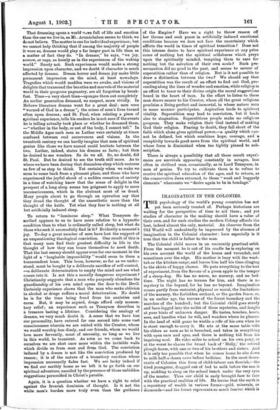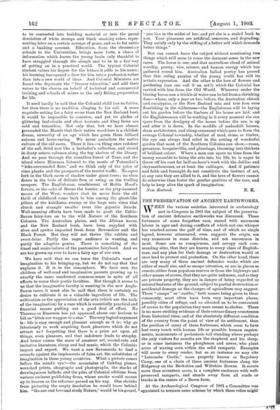IMAGINATION IN THE COLONIES.
THE psychology of the world's young countries has not yet been seriously treated of. Perhaps historians are waiting for the perspective of time to aid them ; and yet studies of character in the making should have a value of their own, and for such studies the modern Colony affords the best, indeed almost the only, material. An observer from the Old World will undoubtedly be impressed by the absence a imagination in the Colonial character : here especially is it true that the child is father to the man.
The Colonial child moves in an eminently practical orbit. From the moment he is out of his cradle he is exploring on his own account the world of the house and verandah, and sometimes over the edge. His mother is busy with the wash- tub or the kitchen-range, and leaves him half his time clinging to the skirts of happy chance. He puts everything to the test of experiment, from the flavour of a green apple to the temper of a sheep-dog. He has no nurse, no nursery, and no bed- time. The night has no terrors for him, and there is no mystery in the beyond, for he has no beyond. Imagination comes partly from restraint, physical or moral, the limitations of the nursery, the forbidden orchard, or the garden fence, or, in an earlier age, the terrors of the forest boundary and the marches of the hundred ; but the Colonial child goes sturdy and bare-legged into the midst of these mysteries, and laughs at your hints of unknown danger. He tastes, touches, hears, sees, and handles what he will, and wanders where he pleases. In the land of wild game he wields a rifle of his own when be is stout enough to carry it. He sits at the same table with his elders as soon as he is breeched, and takes in everything with open ears and eyes, and there is nothing hid from his inquiring soul. He rides miles to school on his own pony, or at the worst he shares the broad back of Dolly,' the retired plough-horse, with one or two of his brothers and sisters. And it is only too possible that when he comes home he sits down to milk half-a-dozen cows before bedtime. In the most demo- cratic of Colonies this form of child-labour can flourish,—the tired youngster, dragged out of bed to milk before the sun is up, nodding to sleep on the school bench under the very eyes of the master. Thus our child is early brought face to face with the practical realities of life. He learns that the earth is a repository of wealth in various forms—gold, minerals, or diamonds—and the forest represents so much lumber which is
to • be converted into building material or into the gaunt desolation of white stumps and black smoking ashes, repre- senting later on a certain acreage of grass, and so to fat cattle and a banking account. Education, from the elementary schools to the Universities, brings more facts, a chaos of information which leaves the young brain only thankful to have struggled through the slough and to be in a, fair way of getting on in a practical world. The typical Colonial student values his degree for the letters it adds to his name; his learning hasropened a door for him into a profession rather than into a new world of ideas. And Colonial Ministers are found who deprecate the " literary education," and add their voices to the chorus on behalf of technical and commercial training and schools of mines as the only fitting preparation for life.
It need hardly be said that the Colonial child has no fairies, but then there is no tradition clinging to his soil. A more
exquisite setting for a fairy scene than the New Zealand bush it would be impossible to conceive, and yet its glades of glittering leaf-clouds and clear torrents and filmy ferns are cold and tenantless. Not only that, but we Have almost persuaded the Maoris that their native wood-lore is a childish dream, unworthy of an age which has given them billiard saloons and horse-racing. We never assimilate the native culture of the old races. There it lies,—a thing once redolent of the soil, dried now like a herbalist's collection, and stored in dusty octavo volumes along the top shelves of the library. And we pass through the countless forest of Tane, and the island where Hinemoa listened to the music of Tutanekai's "lake-surrounded flute," and we think only of the price of rimu planks and the prospects of the tourist traffic. No ogres lurk in the black caves of shadow under giant trees; no elves dance in the beds of delicate fern or swing on the trailing creepers. The English man, reminiscent of Robin Hood's forests, or the oaks of Herne the hunter, or the pixy-haunted moors of the West, wonders that he never feels the old thrill of childhood come back to him among the ghost-like pillars of the kahikatea swamp or the huge rata vines that clutch and strangle smaller trees like gigantic lizards. Well-meaning efforts have been made to graft the Celtic- Saxon fairy-lore on to the wild Nature of the Southern Colonies. The Australian plains, and the African karoo, and the New Zealand bush, have been supplied with elves and sprites imported fresh from Devonshire and the Black Forest. But they will not thrive like rabbits and sweet-briar. Partly the eager audience is wanting, and partly the adaptive genius. There is something of the tinsel and make-believe of the pantomime fairyland. And we are too grown-up ever to have a fairy age of our own.
We have said that we can trace the Colonial's want of imagination to his bringing-up, but we do not say that that explains it. It is in the atmosphere. We have seen the children of well-read and imaginative parents growing up to exactly the same unadorned common-sense in spite of all efforts to rouse their poetic faculties. But though it seems to us that the imaginative faculty is wanting in the new Anglo- Saxon races, it must also be said that there is certainly no desire to cultivate it as a valuable ingredient of life. The cultivation or the appreciation of the arts (which are the tools of the imagination) by a race which is essentially practical and financial means putting out a good deal of effort. No Thoreau or Emerson has yet appeared above our horizon to bid us "hitch our waggon to a star." The very logical argument is life is easy enough and pleasant enough as it is; why go laboriously to work acquiring fresh pleasures which do not attract us ? forgetting that there is a price set upon all things, even pleasure, and that indolence leads to atrophy. And hence comes the mass of amateur art, second-rate and imitative literature, cheap and bad music, which the Colonies import and export. We want a new Savonarola to lead a crusade against the implements of false art, the substitutes of imagination in these young countries. What a picture comes before the mind's eye !—the mountains of tinkling pianos, wretched prints, oleographs and photographs, the stacks of drawinglroom ballads, and the piles of Colonial editions from various eminent publishing firms, whose smoke would mount up to heaven as the reformer passed on his way. One shrinks from .picturing the empty desolation he would leave behind him. "Go out and love and study Nature," would be his gospel, " you live in the midst of her; and yet she is a sealed hook to you. Your pleasures are artificial, sensuous, and degrading; They satisfy only by the stifling of abetter self which demands better things."
But one cannot leave the subject without mentioning two, things which still seem to rouse the dormant sense in the new races. The horse is one, and that marvellous cloud of animal. worship, poetry, vice,, science, and human energy which has gathered round him. Australian ballad poetry has proved„ that this ruling passion of the young world has still its, artistic expression. And the other is the love of flowers and. gardening (can one call it!an art?) which the Colonial has carried with him from the Old World. Wherever under, the blazing karoo sun a trickle of water can be led from a shrinking dam—where, only a year or two before, the Australian sheoak and eucalyptus, or the New Zealand rata and tree fern were flourishing in the wilderness—the Englishman will be laying out his garden before the timbers of his house are laid, and the Englishwoman will be working in it every moment she can, spare from the drudgery of the house before the sun is up- end after it is down. In the muddle of' makeshift houses, sham architecture, and cheap ornament which goes to form the average Colonial township, whether of mud, stone, or timber,, the eye can always find relief in the setting of wonderful.
garden that most of the Southern Colonies can show,—roses, geranium, bougainvillia, and plumbago, blooming into thickets
of brilliant colour. Where a man can spare no time from the money scramble to bring the arts into his life, he is eager to throw off his coat for half-an-hour's work with the dahlias and: chrysanthemums, or at least the cabbages, And if patience: and faith and foresight do not constitute the instinct of art,, at any rate they are allied to it, and the love of flowers cannot do otherwise than foster the gentler qualities of the race, and help to keep alive the spark of imagination.







































 Previous page
Previous page